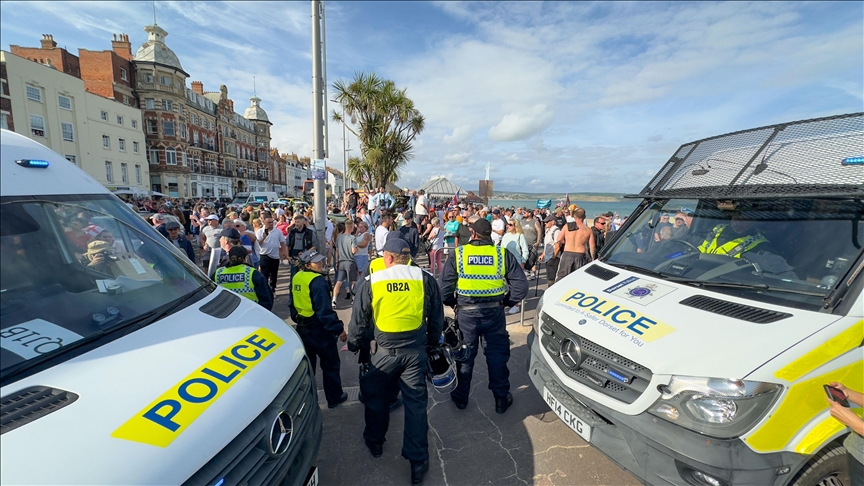Rioters throw petrol bombs at police in Belfast in night of disruption
Man in his 30s, severely injured in attack considered 'hate crime,' remains in 'serious' condition, Northern Ireland Police say
 Far-right groups in England continue anti-immigrant protests, clash with counter-protesters
Far-right groups in England continue anti-immigrant protests, clash with counter-protesters
ANKARA
A man was seriously injured during Monday night's violence in Belfast, Northern Ireland Police said Tuesday.
“A member of the public, a man aged in his 30s, was taken to hospital after he was seriously assaulted,” police said in a statement, adding that he was in “serious” condition.
Police said the attack on this man was treated as a “hate crime,” and condemned the “disgraceful scenes of violence on the streets of south Belfast last night.”
“Police officers came under sustained attack over a number of hours with multiple petrol bombs, heavy masonry and bricks thrown in their direction," the statement read, noting: "Petrol was also poured over a police landrover and set alight, thankfully the occupants of the vehicle were not physically harmed and remained on duty.”
Police also said they arrested a 15-year-old suspect for “riotous behaviour.”
Rioters on Monday night threw petrol bombs, bottles, and bricks at police officers in the Northern Ireland capital Belfast, the Belfast Telegraph said earlier.
Violence broke out at night in a series of protests across the UK since last week and a crowd of over 200 people gathered outside the Islamic Center in Belfast.
Riot police and drones were in the field, according to the Belfast Telegraph, and police also used Attenuating Energy Projectile against rioters.
Monday night’s violence was mainly caused by loyalists who traditionally oppose Irish nationalists aiming for the unity of Northern Ireland and the Republic of Ireland.
“There is no place anywhere on our island for racism or attacks on minority communities,” First Minister Michelle O’Neill wrote on X following earlier disturbances on Saturday, which saw some businesses owned by Muslim refugees destroyed or damaged.
O'Neill said it is “essential to ensure that those responsible for causing and orchestrating the racist violence on Saturday face the full force of the law.”
Far-right violence
The UK has been gripped by far-right riots for days, with violent mobs spewing racist and Islamophobic vitriol and targeting Muslims, minority groups, and migrants.
The riots were fueled by online misinformation that a suspect arrested after a fatal stabbing in Southport, England, last week was a Muslim asylum seeker, a claim which was false.
Three young girls were killed and five more children critically injured during a knife attack as they attended a dance class last Monday.
Far-right groups are reorganizing for more violence targeting asylum and immigration centers in London and across the UK on Wednesday.
“There will be a reckoning for criminals & thugs who took part in violence on streets, burning buildings, attacks on mosques, looting shops & the whipping up of racist violence online,” Home Secretary Yvette Cooper also warned the far-right rioters on X.
Fragile peace
Belfast is a Northern Ireland city where a fragile peace was established after years of violence.
The Troubles – an era of conflict between the British government and pro-British paramilitaries on one side and Irish Republicans and nationalists on the other – ended in 1998 when the Belfast Agreement put an end to decades of armed struggle in the divided UK region of Northern Ireland.
The UK and the Republic of Ireland signed the deal, brokered by the US and eight political parties in Northern Ireland, on April 10, 1998.
The deal, dubbed the Good Friday Agreement, largely saw the end of the Troubles-era violence, in which 3,500 people lost their lives.
Anadolu Agency website contains only a portion of the news stories offered to subscribers in the AA News Broadcasting System (HAS), and in summarized form. Please contact us for subscription options.







